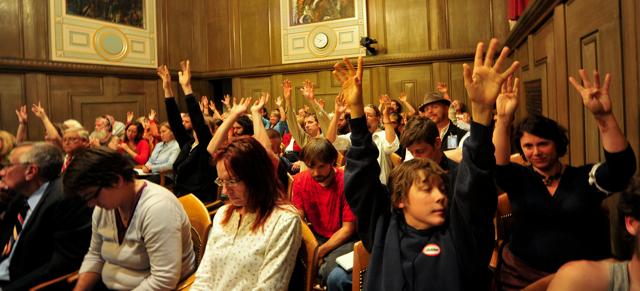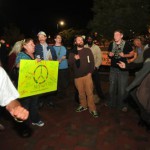- Assent! Occupy Asheville demonstrators filled the Asheville City Council chambers and protested on the steps of City Hall on Oct. 25, requesting space to camp as they continue public protests in solidarity with the Occupy Wall Street movement. Here they show their approval of a comment by waving their hands. photos by Bill Rhodes
Asheville City Council Oct. 25, 2011 meeting
- Protesters’ usage fees waived
- City, MSD form joint task force on water system
Occupy Asheville protesters packed the Council chamber and an overflow room during Asheville City Council's Oct. 25 meeting, picking up where they’d left off two weeks before. In the interim, some 30 to 50 protesters — who are “broadly criticizing corporate dominance and government corruption,” according to one of their announcements — had been camping under the Lexington Avenue overpass at the edge of downtown.
The group had originally approached City Council Oct. 11, seeking permission to camp on Roger McGuire Green in Pack Square Park (see “State Your Occupation,” Oct. 19 Xpress). But Council members, noting that the item wasn’t on the agenda and citing concerns about the effects on other users of the park, instead instructed staff to negotiate a suitable temporary spot until a more permanent location could be found. The city's Parks, Recreation and Cultural Arts Department proposed the area beneath the bridge, and Occupy Asheville representatives accepted it, though some protesters expressed reservations.
Group representatives and sympathizers criticized the choice, calling the spot “toxic” and “horrible” and voicing safety and air-quality concerns. They also questioned the city’s whole approach to dealing with the protesters.
“I feel like the City Council is trying to handle this [like] a special event or an organized group,” said Rosetta Starr, who founded the nearby Rosetta's Kitchen. “There are no formal organizers. I'm an independent person that comes to [the group’s] general assemblies. Occupy Asheville is not a group you can permit: It's an assembly of the people.”
Occupy Asheville representative Milton Byrd agreed, saying their petition to exempt the group from the city's parks curfew to allow overnight camping was altogether different from the usual requests Council receives.
“This is a public assembly; this is not a typical organized group such as Bele Chere,” he argued. “This is a 'we, the people' movement in regards to self-government. We're looking to petition the government for grievances as 'we, the people.' This is a constitutional action.”
Not everyone who spoke during the public-comment period supported the protesters' demands. Rod Hudgins of the Council of Independent Business owners said that while his group respects free-speech rights, “The city of Asheville has a process to follow. To alter this process and allow special privileges for any group is wrong and will create a precedent that will cause other groups and organizations to request the same consideration.”
Heather Dillashaw of Homeward Bound, a local nonprofit advocating for the homeless, worried about the encampment's sustainability. Homeward Bound staff, she noted, had been called in several times to mediate disputes between Occupy Asheville protesters and homeless people who also congregate there.
Meanwhile, Robert Zachary, another Occupy Asheville representative, returned the group’s application for long-term camping at the Lexington Avenue spot, symbolically rejecting the idea.
Council member Gordon Smith praised the protesters, staff and City Council, saying they'd navigated a difficult situation.
“You'll find me very much in agreement with the political aims regarding economic justice and the propriety of government,” he told the crowd. “I believe that Occupy Wall Street and Occupy Asheville both have tremendous promise as growing social movements to make enduring change.”
Nonetheless, continued Smith, a leaderless movement “makes it very difficult for government or any other institution to figure out how to interact with you. Who do we make an agreement with? Who do we hold accountable? Who do we talk to? I talked to 20 different people, and none of them knew what I told the other people.”
Opinions about where to camp — and whether to ask for government approval — differed widely among the people he encountered, noted Smith.
“I'm acutely aware of what we would be doing if we allowed overnight permitted camping in public parks,” he said, pointing out that the Ku Klux Klan and Westboro Baptist Church could show up and ask for the same right.
“Based on the conversations I've had with the people at Occupy Asheville, I don't believe the presence or absence of an enduring, permitted relationship with the city is going to either make or break this movement,” Smith observed, adding, “If this is to endure, it won't be because the government said it could.”
Smith then moved that the Lexington Avenue encampment be shut down Oct. 28 and that the usage fees the group had already incurred be waived. He also directed the Asheville Police Department to make sure it was properly trained to respond peacefully to nonviolent civil disobedience. City Manager Gary Jackson said this had already been done.
After Smith had made his motions, Matthew Burd thanked the city for working with the encampment while repeating the group’s request that it be allowed to camp in Pack Square Park.
“A better motion would be to open up public parks 24 hours for free-speech purposes,” said Burd. “That was brought forth two weeks ago. I'm surprised no one on Council had a motion to give us a camping space somewhere. … No one had a creative idea to allow that to happen.”
Mayor Terry Bellamy was less sympathetic. She wanted the protesters to pay the fees, saying they were taking money from the working class of Asheville because of the time city staff had devoted to dealing with the movement.
“We've had city employees that haven't had a raise in three years,” said Bellamy. “There's been police time and other time that's been spent on this. The residents of Asheville are paying for this: Is that fair for individuals? You say you're helping the working class, but you're hurting them, because the police could be elsewhere. There's an impact on people who aren't at the table.”
In fact, the mayor noted, the city had even detailed additional police officers for the Council meeting itself, though she gave no reason for the move.
Council member Cecil Bothwell said he fully supports the movement, touting his efforts to find it increased union and political support.
“I'm the one who suggested to the AFL-CIO that they provide the Porta-Johns; I'm working the ACLU to provide legal support,” said Bothwell. “I believe that regardless of what we do tonight, Occupy is going to go on. It's a moral and patriotic movement that's forming, challenging the immorality of our system as it's evolved at this point.”
Vice Mayor Brownie Newman voiced sympathy for the protesters but said he didn't support allowing indefinite camping in public parks. Newman cited Council’s votes requiring a living wage for city employees, allowing domestic-partner benefits and increasing energy efficiency as evidence that many in city government share the movement's goals.
The motion to prohibit continued camping at the Lexington Avenue site was approved 6-1, with Bothwell opposed.
The motion to waive the fees was narrowly approved on a 4-3 vote, with Council members Bill Russell and Jan Davis joining Bellamy in opposition.
Bothwell moved that the city allocate Occupy Asheville a long-term camping spot in a public park and waive the usual 10 p.m. curfew, but no one seconded the motion.
After the votes, about 60 Occupy Asheville participants gathered peacefully on the steps of City Hall, shouting and chanting slogans such as “This is what democracy looks like” and “Give cops a raise” as 22 APD officers stood by. Over time, the numbers dwindled, and the remaining protesters discussed camping options once the Lexington Avenue site is shut down.
As the Council meeting ended, the assembled demonstrators delivered the following instructions to interim police Chief Wade Wood:
"Plan for a peaceful transition and closure of the encampment on Lexington Avenue. Continue to respect and protect the rights of public protesters while using discretion wisely in the enforcement of laws."
And at 10 p.m., eight protesters (including Burd) refused to leave Pack Square Park and were arrested.
In a statement released the next day, Occupy Asheville media representative Naomi Archer asserted: “This isn’t business as usual — we are facing an economic and social crisis on a global scale. Meanwhile, the city treats this emergency protest assembly like a seasonal craft fair.”
Other business
In other action, City Council: • Narrowly approved the second reading of a zoning change allowing a parcel in Montford to be subdivided to build an additional single-family home. Proponents have called it a good compromise that supports affordable housing; opponents, including the Montford Neighborhood Association, say it sets a precedent for a level of density that threatens neighborhood integrity. The vote was 4-3, with Davis, Bellamy and Council member Esther Manheimer opposed. • Appointed Manheimer and Davis to a joint task force with the Metropolitan Sewerage District formed in response to a study commission created by the state Legislature. Chaired by Rep. Tim Moffitt of Asheville, the commission will consider whether Asheville’s water system should remain city property or be given to MSD or some other entirely independent entity. Moffitt’s legislation originally called for immediately seizing the water system without compensation; he later revised it to simply establish the study commission.
— David Forbes can be reached at 251-1333, ext. 137, or at dforbes@mountainx.com.





Before you comment
The comments section is here to provide a platform for civil dialogue on the issues we face together as a local community. Xpress is committed to offering this platform for all voices, but when the tone of the discussion gets nasty or strays off topic, we believe many people choose not to participate. Xpress editors are determined to moderate comments to ensure a constructive interchange is maintained. All comments judged not to be in keeping with the spirit of civil discourse will be removed and repeat violators will be banned. See here for our terms of service. Thank you for being part of this effort to promote respectful discussion.